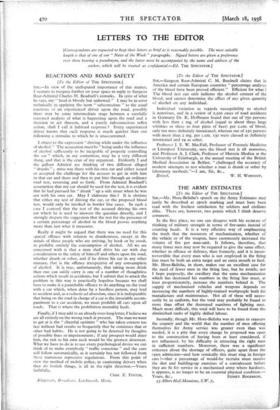LETTERS TO THE EDITOR
[Correspondents are requested to keep their letters as brief as is reasonably possible. The most suitable length is that of one of our " News of the Week " paragraphs. Signed letters are given a preference over those bearing a pseudonym, and the latter must be accompanied by the name and address of the author, which will be treated as confidential:—Ed. THE SPECTATOR.] REACTIONS AND ROAD SAFETY [To the Editor of THE SPECTATOR.] SIR,—In view of the undisputed importance of this matter, I venture to trespass further on your space to reply to Surgeon Rear-Admiral Charles M. Beadnell's remarks. In spite of what he says, my " head is bloody but unbowed." I may be in error technically in applying the term " subconscious " to the usual reactions of an experienced driver upon the road, possibly there may be some intermediate stage between a carefully reasoned analysis of what is happening upon the road and a decision to act thereon, and a purely sub-conscious reflex action, shall I call it habitual response ? Every experienced driver knows that such response is much quicker than one following a stimulus to which he is unaccustomed.
I object to the expression "driving while under the influence of alcohol." The accusation must be " being under the influence of alcohol sufficiently to be incapable of properly controlling the car " which, in my contention, may be a very different thing, and that is the crux of my argument. Evidently I and the gallant Admiral are thinking of two different alleged " drunks " ; mine was there with his own car and either issued or accepted the challenge for the accuser to get in with him in that car and there and then to put him through an ordinary road test, reversing and so forth. From Admiral Beadnell's assumption that my car should be used for the test, it is evident that he had pursued his "'drunk " up a side street when he was not with his own car. May I elaborate this ? It is obvious that either my test of driving the car, or the proposed blood test, would only be invoked in border line cases. In such a case I contend that the test of the accused driving his own ear which he is used to answers the question directly, and I strongly dispute the suggestion that the test for the presence of a certain percentage of alcohol in the blood proves anything more than just what it measures.
Really it might be argued that there was no need for this special offence with relation to drunkenness, except in the minds of those people who are striving, by hook or by crook, to prohibit entirely the consumption of alcohol. All we are concerned with is that a man shall drive his car with due consideration to the safety of himself and others upon the road, whether drunk or sober, and if he drives his car in any other manner, that is the offence irrespective of any consumption of alcohol. It is true, unfortunately, that taking more drink than one can safely carry is one of a number of thoughtless actions which result in accidents, but I submit that to attack the problem in this way is practically hopeless because we shall have to make it a punishable offence to do anything on the road with a car which, when done by a heedless person, may lead to accident and, as a reductio ad absurdum, since it is indisputable that being on the road in charge of a car is the invariable accom- paniment to a car accident, we must prohibit all cars upon all roads. That is where the prohibition mentality leads.
Finally, if I may add to an already over-long letter, I believe we are all entirely on the wrong track at present. The man we want to get at is the " cheerful optimist " who has taken corners too fast without bad results so frequently that he continues that or other bad habits. He is not going to be deterred by thoughts of possible fines or imprisonment; if any prospect would deter him, the risk to his own neck would be the greatest deterrent. What we have to do is to use every psychological device we can think of to make everybody " traffic conscious " and the cure will follow automatically, as it certainly has not followed from these numerous repressive regulations. From this point of view the method of mobile police, in cautioning drivers when they do foolish things, is all in the right direction.—Yours faithfully,
CHAS. E. FOSTER.
Kingswcir, Broadway, Letchworth, Herts.














































 Previous page
Previous page